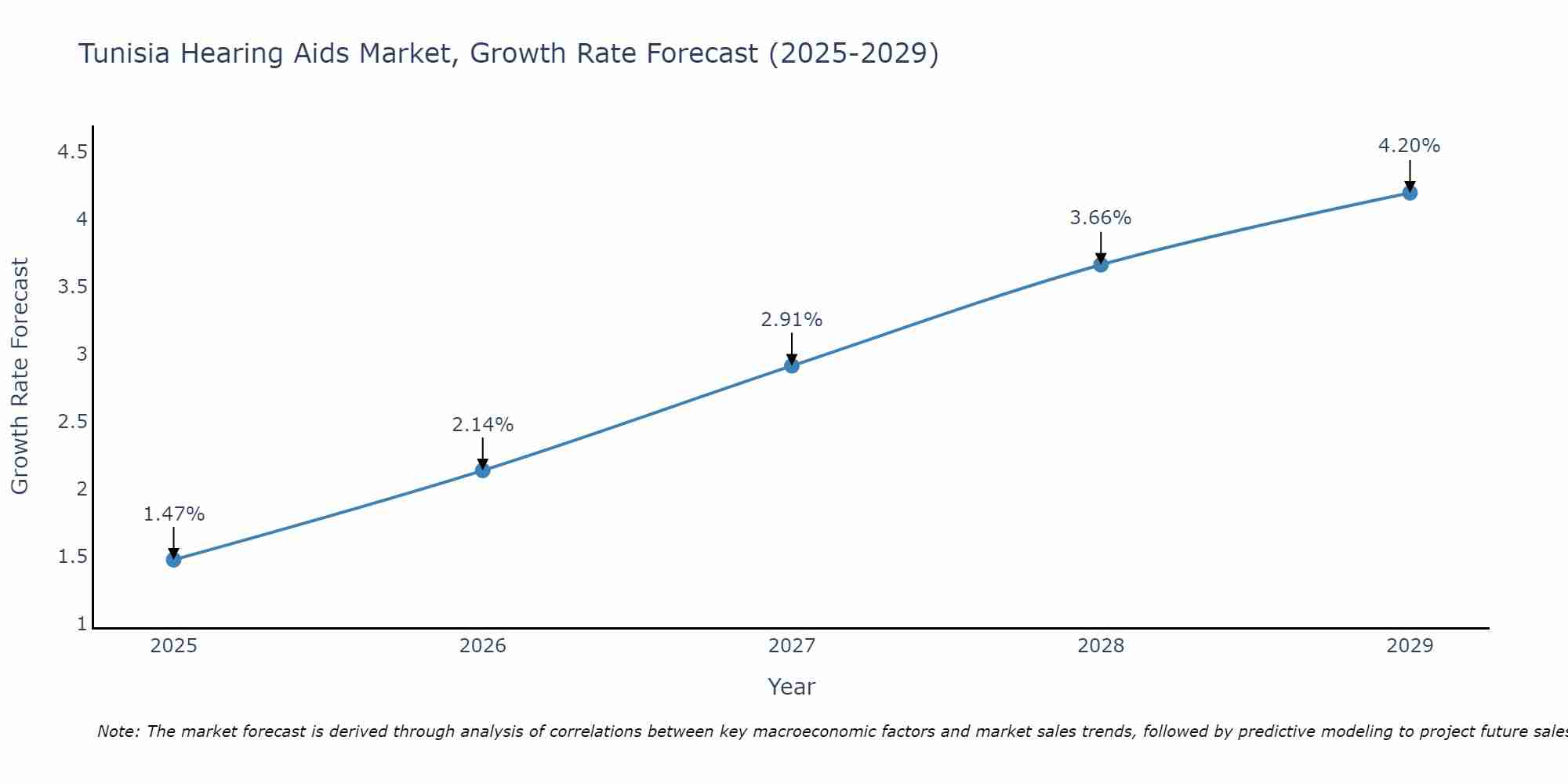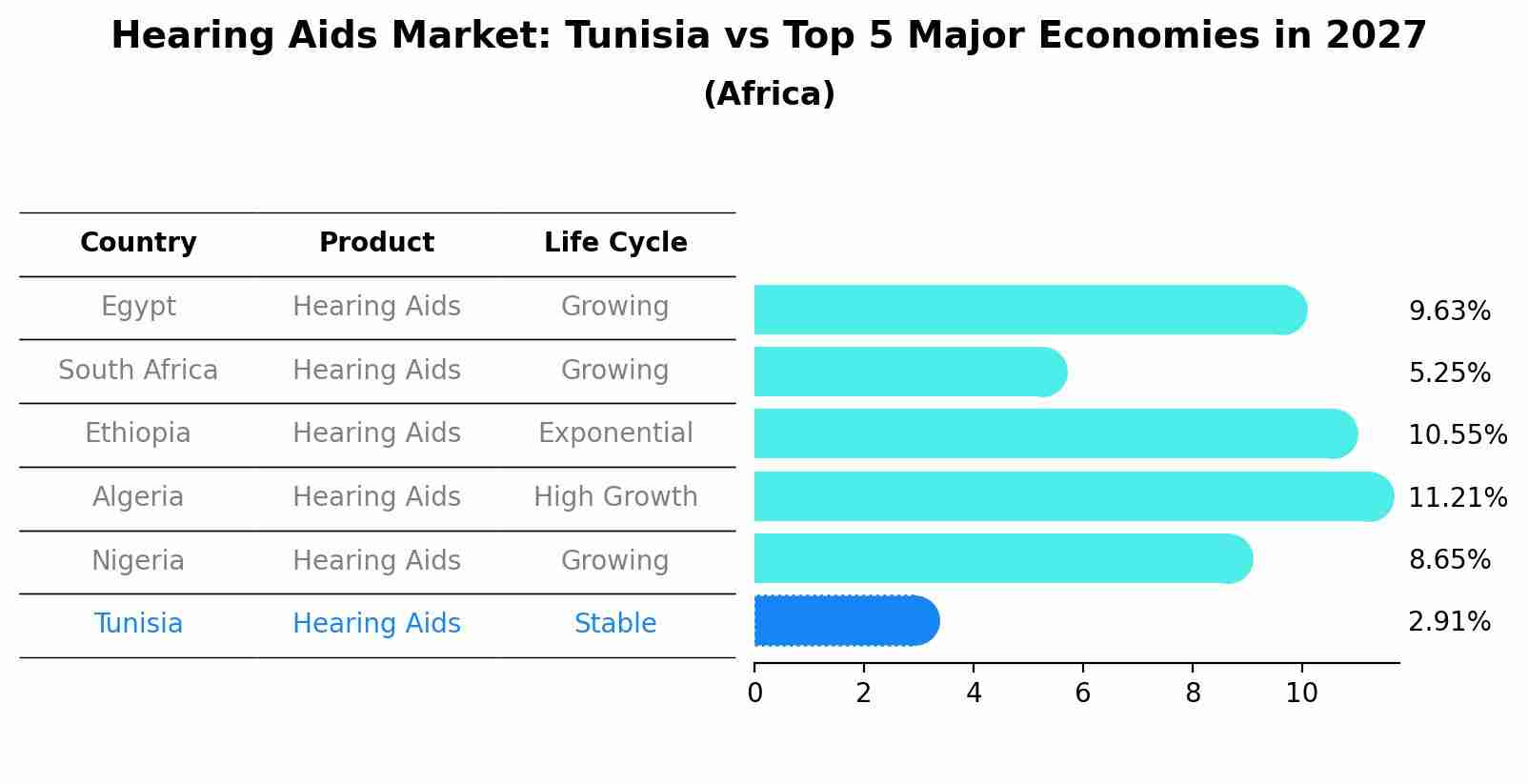Tunisia Hearing Aids Market Outlook | Forecast, Trends, Value, Industry, Share, Growth, Companies, Analysis, Size, Revenue & COVID-19 IMPACT
| Product Code: ETC364794 | Publication Date: Aug 2022 | Updated Date: Aug 2025 | Product Type: Market Research Report | |
| Publisher: 6Wresearch | Author: Sachin Kumar Rai | No. of Pages: 75 | No. of Figures: 35 | No. of Tables: 20 |
Tunisia Hearing Aids Market Size Growth Rate
The Tunisia Hearing Aids Market is likely to experience consistent growth rate gains over the period 2025 to 2029. From 1.47% in 2025, the growth rate steadily ascends to 4.20% in 2029.

Hearing Aids Market: Tunisia vs Top 5 Major Economies in 2027 (Africa)
In the Africa region, the Hearing Aids market in Tunisia is projected to expand at a stable growth rate of 2.91% by 2027. The largest economy is Egypt, followed by South Africa, Ethiopia, Algeria and Nigeria.

Tunisia Hearing Aids Market Synopsis
The Tunisia hearing aids market is growing steadily due to factors such as an aging population, increased awareness about hearing loss, and advancements in technology. As per market research data, the demand for hearing aids in Tunisia is rising, driven by a higher prevalence of hearing impairment and an increasing number of individuals seeking treatment for hearing loss. The market is primarily dominated by behind-the-ear (BTE) and in-the-ear (ITE) hearing aids, with digital technology gaining popularity for its improved performance and customization options. Key players in the Tunisia hearing aids market include global manufacturers as well as local distributors, catering to the diverse needs of consumers. The market is expected to continue its growth trajectory, supported by ongoing technological innovations and a greater focus on addressing hearing health issues in the country.
Tunisia Hearing Aids Market Trends
In the Tunisia Hearing Aids Market, there is a growing trend towards more advanced and discreet hearing aid technology. Consumers are increasingly seeking smaller, more comfortable, and technologically advanced devices that offer improved sound quality and connectivity features. Rechargeable hearing aids are also gaining popularity due to their convenience and eco-friendly nature, reducing the reliance on disposable batteries. Additionally, there is a rising awareness and acceptance of hearing loss as a common issue among all age groups, leading to a higher demand for hearing aids across different demographics. The market is also seeing a shift towards online purchasing channels for hearing aids, providing consumers with more convenience and accessibility to a wider range of products and brands.
Tunisia Hearing Aids Market Challenges
In the Tunisia Hearing Aids Market, some challenges include limited awareness and education about hearing loss and the benefits of hearing aids among the general population. This results in a lower demand for hearing aids compared to other medical devices. Additionally, the high cost of hearing aids can be a significant barrier for many Tunisians, especially considering the lack of comprehensive insurance coverage for hearing healthcare. Furthermore, there is a shortage of qualified audiologists and hearing healthcare professionals in Tunisia, leading to delays in diagnosis and treatment for individuals with hearing loss. Addressing these challenges through public awareness campaigns, affordability measures, and investment in audiology education and training could help improve access to hearing aids and services in the country.
Tunisia Hearing Aids Market Investment Opportunities
The Tunisia Hearing Aids Market presents promising investment opportunities due to the increasing prevalence of hearing impairments among the population, driven by factors such as an aging population and higher exposure to noise pollution. With a growing awareness of hearing health and a rising demand for advanced hearing solutions, there is a need for innovative and technologically advanced hearing aids in the market. Investors can capitalize on this by partnering with manufacturers or distributors of hearing aids to introduce new products tailored to the Tunisian market. Additionally, investing in clinics or healthcare facilities specializing in audiology services can also be a lucrative opportunity to cater to the growing demand for hearing healthcare services in Tunisia.
Jordan Agar Market Government Policies
The Tunisian government has implemented various policies aimed at supporting the hearing aids market in the country. These policies include subsidies for hearing aids, tax incentives for manufacturers, and regulations to ensure the quality and safety of hearing aid devices. The government has also established programs to raise awareness about hearing loss and the importance of early intervention. Additionally, there are initiatives to improve access to hearing healthcare services, such as training more audiologists and creating partnerships with healthcare providers. Overall, the government`s policies are focused on promoting the availability and affordability of hearing aids, as well as enhancing the overall quality of hearing healthcare services in Tunisia.
Tunisia Hearing Aids Market Future Outlook
The Tunisia Hearing Aids Market is expected to show steady growth in the coming years due to an aging population, increasing awareness about hearing health, and advancements in technology. The market is likely to be driven by rising prevalence of hearing loss among the elderly population, as well as younger individuals with hearing impairments. Additionally, the adoption of digital hearing aids and the availability of a variety of products at different price points are expected to fuel market growth. Furthermore, government initiatives to provide better access to hearing healthcare services and increased disposable income among the population are also factors that will contribute to the expansion of the Tunisia Hearing Aids Market in the future.
Key Highlights of the Report:
- Tunisia Hearing Aids Market Outlook
- Market Size of Tunisia Hearing Aids Market, 2021
- Forecast of Tunisia Hearing Aids Market, 2031
- Historical Data and Forecast of Tunisia Hearing Aids Revenues & Volume for the Period 2018 - 2031
- Tunisia Hearing Aids Market Trend Evolution
- Tunisia Hearing Aids Market Drivers and Challenges
- Tunisia Hearing Aids Price Trends
- Tunisia Hearing Aids Porter's Five Forces
- Tunisia Hearing Aids Industry Life Cycle
- Historical Data and Forecast of Tunisia Hearing Aids Market Revenues & Volume By Product for the Period 2018 - 2031
- Historical Data and Forecast of Tunisia Hearing Aids Market Revenues & Volume By In-the-Ear Hearing Aids for the Period 2018 - 2031
- Historical Data and Forecast of Tunisia Hearing Aids Market Revenues & Volume By Receiver in-the-Ear Hearing Aids for the Period 2018 - 2031
- Historical Data and Forecast of Tunisia Hearing Aids Market Revenues & Volume By Behind-the-Ear Hearing Aids for the Period 2018 - 2031
- Historical Data and Forecast of Tunisia Hearing Aids Market Revenues & Volume By Canal Hearing Aids for the Period 2018 - 2031
- Historical Data and Forecast of Tunisia Hearing Aids Market Revenues & Volume By Technology for the Period 2018 - 2031
- Historical Data and Forecast of Tunisia Hearing Aids Market Revenues & Volume By Analog for the Period 2018 - 2031
- Historical Data and Forecast of Tunisia Hearing Aids Market Revenues & Volume By Digital for the Period 2018 - 2031
- Historical Data and Forecast of Tunisia Hearing Aids Market Revenues & Volume By Sales Channel for the Period 2018 - 2031
- Historical Data and Forecast of Tunisia Hearing Aids Market Revenues & Volume By Retail Sales for the Period 2018 - 2031
- Historical Data and Forecast of Tunisia Hearing Aids Market Revenues & Volume By Government Purchases for the Period 2018 - 2031
- Historical Data and Forecast of Tunisia Hearing Aids Market Revenues & Volume By E-commerce for the Period 2018 - 2031
- Tunisia Hearing Aids Import Export Trade Statistics
- Market Opportunity Assessment By Product
- Market Opportunity Assessment By Technology
- Market Opportunity Assessment By Sales Channel
- Tunisia Hearing Aids Top Companies Market Share
- Tunisia Hearing Aids Competitive Benchmarking By Technical and Operational Parameters
- Tunisia Hearing Aids Company Profiles
- Tunisia Hearing Aids Key Strategic Recommendations
Frequently Asked Questions About the Market Study (FAQs):
- Single User License$ 1,995
- Department License$ 2,400
- Site License$ 3,120
- Global License$ 3,795
Search
Related Reports
- Australia IT Asset Disposal Market (2025-2031) | Strategy, Consumer Insights, Analysis, Investment Trends, Opportunities, Growth, Size, Share, Industry, Revenue, Segments, Value, Segmentation, Supply, Forecast, Restraints, Outlook, Competition, Drivers, Trends, Demand, Pricing Analysis, Competitive, Strategic Insights, Companies, Challenges
- UAE Building Thermal Insulation Market Outlook (2025-2031) | Revenue, Companies, Share, Trends, Growth, Size, Forecast, Industry, Analysis & Value
- Portugal Electronic Document Management Market (2025-2031) | Strategy, Consumer Insights, Analysis, Investment Trends, Opportunities, Growth, Size, Share, Industry, Revenue, Segments, Value, Segmentation, Supply, Forecast, Restraints, Outlook, Competition, Drivers, Trends, Demand, Pricing Analysis, Competitive, Strategic Insights, Companies, Challenges
- France Electronic Document Management Market (2025-2031) | Strategy, Consumer Insights, Analysis, Investment Trends, Opportunities, Growth, Size, Share, Industry, Revenue, Segments, Value, Segmentation, Supply, Forecast, Restraints, Outlook, Competition, Drivers, Trends, Demand, Pricing Analysis, Competitive, Strategic Insights, Companies, Challenges
- Portugal Occupational Health & Safety Services Market (2025-2031) | Strategy, Consumer Insights, Analysis, Investment Trends, Opportunities, Growth, Size, Share, Industry, Revenue, Segments, Value, Segmentation, Supply, Forecast, Restraints, Outlook, Competition, Drivers, Trends, Demand, Pricing Analysis, Competitive, Strategic Insights, Companies, Challenges
- Netherlands Occupational Health and Safety Services Market (2025-2031) | Strategy, Consumer Insights, Analysis, Investment Trends, Opportunities, Growth, Size, Share, Industry, Revenue, Segments, Value, Segmentation, Supply, Forecast, Restraints, Outlook, Competition, Drivers, Trends, Demand, Pricing Analysis, Competitive, Strategic Insights, Companies, Challenges
- Belgium and Luxembourg Facility Management Market (2025-2031) | Strategy, Consumer Insights, Analysis, Investment Trends, Opportunities, Growth, Size, Share, Industry, Revenue, Segments, Value, Segmentation, Supply, Forecast, Restraints, Outlook, Competition, Drivers, Trends, Demand, Pricing Analysis, Competitive, Strategic Insights, Companies, Challenges
- Russia Women Intimate Apparel Market (2025-2031) | Strategy, Consumer Insights, Analysis, Investment Trends, Opportunities, Growth, Size, Share, Industry, Revenue, Segments, Value, Segmentation, Supply, Forecast, Restraints, Outlook, Competition, Drivers, Trends, Demand, Pricing Analysis, Competitive, Strategic Insights, Companies, Challenges
- Africa Chocolate Market (2025-2031) | Size, Share, Trends, Growth, Revenue, Analysis, Forecast, industry & Outlook
- Global Hydroxychloroquine And Chloroquine Market (2025-2031) | Industry, Trends, Size, Outlook, Growth, Value, Companies, Revenue, Analysis, Share, Forecast
Industry Events and Analyst Meet
Our Clients
Whitepaper
- Middle East & Africa Commercial Security Market Click here to view more.
- Middle East & Africa Fire Safety Systems & Equipment Market Click here to view more.
- GCC Drone Market Click here to view more.
- Middle East Lighting Fixture Market Click here to view more.
- GCC Physical & Perimeter Security Market Click here to view more.
6WResearch In News
- Doha a strategic location for EV manufacturing hub: IPA Qatar
- Demand for luxury TVs surging in the GCC, says Samsung
- Empowering Growth: The Thriving Journey of Bangladesh’s Cable Industry
- Demand for luxury TVs surging in the GCC, says Samsung
- Video call with a traditional healer? Once unthinkable, it’s now common in South Africa
- Intelligent Buildings To Smooth GCC’s Path To Net Zero













